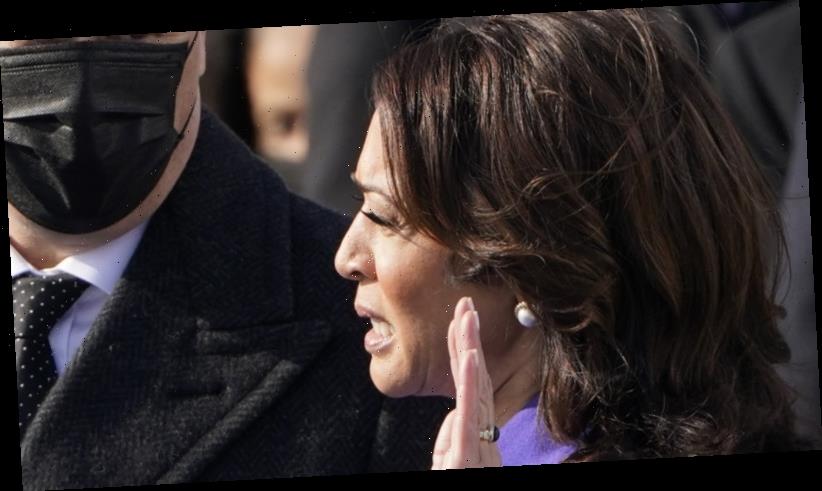Merriam-Webster, the United States’ leading language provider announced it was adding over 520 new words and definitions to the publisher’s website. These new words include “COVID-19,” “second gentleman,” “long-hauler,” “flex,” “ASMR” and “sapiosexual.”
Before the pandemic, “long-hauler” was defined as a person or vehicle that travels long distances, but it now has an additional definition: “a person who experiences one or more long-term effects following initial improvement or recovery from a serious illness (such as COVID-19).“
“ASMR,” or autonomous sensory meridian response, means “a pleasant tingling sensation that originates on the back of the scalp and often spreads to the neck and upper spine, that occurs in some people in response to a stimulus (such as a particular kind of sound or movement), and that tends to have a calming effect.“
‘Second gentleman’ Doug Emhoff with wife Kamala Harris as she is sworn in as Vice-President.Credit:AP
“Second gentleman” has come into use because of Vice President Kamala Harris’ husband, Doug Emhoff. Merriam-Webster defines it as “the husband or male partner of a vice president or second in command of a country or jurisdiction.” As a verb, “flex” means to bend; informally, this word is defined as “to talk in a boastful or aggressive way.”
So how does a word or a revised definition of a word qualify for entry in the dictionary?
Emily Brewster, a senior editor from Merriam-Webster, says the lexicographers have criteria that are somewhat flexible.
“In order for a word to be considered for entry in our dictionaries, we have to have evidence that shows this is really an established member of the language,” she says. “For that to be the case, we look to see that a word is widely used but in a wide variety of texts by a wide variety of people over an extensive period of time. … We want the use (of the word) to demonstrate that there’s an established meaning.“
Brewster notes lexicographers don’t only look at published, edited texts; nor do lexicographers create new words out of thin air. Rather, they observe and report on language.
For instance, the word “yeet” has gained popularity and use over the last couple of years. Brewster uses this as an example of a word that exists and is used but it’s meaning is unclear, which is why it has not qualified for entry in the dictionary. Overall, “yeet” is positive but can mean excitement or approval.
The term “COVID-19” was added in the dictionary in a record 34 days. Lexicographers usually measure a word’s addition to the dictionary in years, sometimes decades, according to the most recent episode of Merriam-Webster’s podcast, “Word Matters.” Before “COVID-19,” the fastest a word that entered the dictionary was two years with the term “AIDS,” which was added in 1984, two years after its coinage.
“The level of use that (COVID-19) was seeing and the heightened recognition that the term has really outweighs the amount of needing to see it in use for an extended period of time,” she says. “So in a case like this, the word was instantly everywhere. … Even at 34 days old, we knew this word is not going anywhere. You could cure the disease the next day, and it would still be appearing in books and articles.“
Brewster says lexicographers pay attention to how language changes, and how culture and social media influence the addition of new words. For example, @, the symbol for “at,” moved online with email addresses and then was attached to social media usernames, but now has evolved to mean “to respond to, challenge, or disparage the claim or opinion of (someone)” as in the phrase “don’t @ me.“
“There is so much discourse happening online now in social media,” Brewster says. “And in some ways, I think it’s actually impossible to really draw a line and say that a word becomes established because it’s appearing in social media or a word goes from social media into broader use. It’s clear that the two are feeding each other.“
She noted the increase in written communication that hasn’t been vetted by editors and other gatekeepers: “Now you can read whatever (people) tweet, whatever they want to put on their blog. There’s so much informal communication available to be encountered.“
Although the coronavirus pandemic has played a huge role in our collective experience as a society, this new update from Merriam-Webster also included words relating to identity, gender and sexuality.
“The English language is still continuing development of terms that have to do with identity,” she says. “So ‘BIPOC’ (meaning Black, indigenous and people of colour) was entered for this update and also ‘folx.’ I think (folx) is so interesting, especially because it absolutely requires that the word be seen. It really points very directly at how prominent written language is right now, because you cannot hear the difference when somebody says the word ‘folks’ with a ks or with an x.”
“Sapiosexual” was also added. It refers to romantic attraction to highly intelligent people.
“We’ve been monitoring words to do with gender and sexuality for a long time now, and this is in a long lineage of terms that have been added,” said Brewster.
Chicago Tribune
Most Viewed in Culture
Source: Read Full Article

